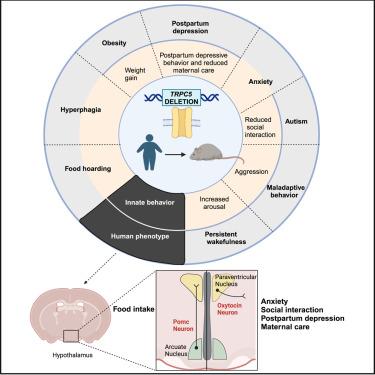
瞬时受体电位通道 5 的缺失导致肥胖和产后抑郁
Cell
(
IF
42.5
)
Pub Date : 2024-07-02
, DOI:
10.1016/j.cell.2024.06.001
Yongxiang Li
1
,
Tessa M Cacciottolo
2
,
Na Yin
1
,
Yang He
3
,
Hesong Liu
1
,
Hailan Liu
1
,
Yuxue Yang
4
,
Elana Henning
2
,
Julia M Keogh
2
,
Katherine Lawler
2
,
Edson Mendes de Oliveira
2
,
Eugene J Gardner
5
,
Katherine A Kentistou
5
,
Panayiotis Laouris
2
,
Rebecca Bounds
2
,
Ken K Ong
5
,
John R B Perry
6
,
Inês Barroso
7
,
Longlong Tu
1
,
Jonathan C Bean
1
,
Meng Yu
1
,
Kristine M Conde
1
,
Mengjie Wang
1
,
Olivia Ginnard
1
,
Xing Fang
1
,
Lydia Tong
1
,
Junying Han
1
,
Tia Darwich
1
,
Kevin W Williams
8
,
Yongjie Yang
1
,
Chunmei Wang
1
,
Shelagh Joss
9
,
Helen V Firth
10
,
Yong Xu
11
,
I Sadaf Farooqi
2
Affiliation
USDA/ARS Children's Nutrition Research Center, Department of Pediatrics, Baylor College of Medicine, Houston, TX, USA.
University of Cambridge Metabolic Research Laboratories, Institute of Metabolic Science and NIHR Cambridge Biomedical Research Centre, Cambridge, UK.
USDA/ARS Children's Nutrition Research Center, Department of Pediatrics, Baylor College of Medicine, Houston, TX, USA; Jan and Dan Duncan Neurological Research Institute, Department of Pediatrics, Baylor College of Medicine, One Baylor Plaza, Houston, TX 77030, USA.
USDA/ARS Children's Nutrition Research Center, Department of Pediatrics, Baylor College of Medicine, Houston, TX, USA; Taizhou People's Hospital, Medical School of Yangzhou University, Taizhou, Jiangsu, China.
MRC Epidemiology Unit, Institute of Metabolic Science and NIHR Cambridge Biomedical Research Centre, Cambridge, UK.
University of Cambridge Metabolic Research Laboratories, Institute of Metabolic Science and NIHR Cambridge Biomedical Research Centre, Cambridge, UK; MRC Epidemiology Unit, Institute of Metabolic Science and NIHR Cambridge Biomedical Research Centre, Cambridge, UK.
Exeter Centre of Excellence for Diabetes Research (EXCEED), University of Exeter Medical School, Exeter, UK.
Center for Hypothalamic Research, Department of Internal Medicine, University of Texas Southwestern Medical Center at Dallas, Dallas, TX 75390-9077, USA.
West of Scotland Regional Genetics Service, Queen Elizabeth University Hospital, Glasgow, UK.
Department of Clinical Genetics, Cambridge University Hospitals NHS Foundation Trust & Wellcome Sanger Institute, Cambridge, UK.
USDA/ARS Children's Nutrition Research Center, Department of Pediatrics, Baylor College of Medicine, Houston, TX, USA; Department of Molecular and Cellular Biology, Baylor College of Medicine, Houston, TX, USA; Department of Medicine, Baylor College of Medicine, Houston, TX, USA.

下丘脑神经回路调节本能行为,惠阳保姆13825404095例如寻找食物、战斗/逃跑反应、社交和产妇护理。在这里,我们发现了染色体 Xq23 上的微缺失,破坏了大脑表达的瞬时受体电位 (TRP) 通道 5 (TRPC5)。这一系列通道检测感觉刺激并将其转换为大脑可解释的电信号。雄性缺失携带者表现出寻食、肥胖、焦虑和自闭症,这些在携带人类功能丧失突变的敲入雄性小鼠中得到了概括。携带缺失的妇女患有严重的产后抑郁症。作为母亲,雌性敲击小鼠表现出快感缺乏和抑郁样行为,对后代的照顾受损。下丘脑室旁核中催产素神经元的缺失导致两性肥胖和女性产后抑郁行为,而敲入小鼠催产素神经元的过表达逆转了这些表型。我们证明 TRPC5 在介导对生存至关重要的先天人类行为中起关键作用,包括寻找食物和孕产妇护理。

Loss of transient receptor potential channel 5 causes obesity and postpartum depression
Hypothalamic neural circuits regulate instinctive behaviors such as food seeking, the fight/flight response, socialization, and maternal care. Here, we identified microdeletions on chromosome Xq23 disrupting the brain-expressed transient receptor potential (TRP) channel 5 (TRPC5). This family of channels detects sensory stimuli and converts them into electrical signals interpretable by the brain. Male deletion carriers exhibited food seeking, obesity, anxiety, and autism, which were recapitulated in knockin male mice harboring a human loss-of-function mutation. Women carrying deletions had severe postpartum depression. As mothers, female knockin mice exhibited anhedonia and depression-like behavior with impaired care of offspring. Deletion of from oxytocin neurons in the hypothalamic paraventricular nucleus caused obesity in both sexes and postpartum depressive behavior in females, while overexpression in oxytocin neurons in knock-in mice reversed these phenotypes. We demonstrate that TRPC5 plays a pivotal role in mediating innate human behaviors fundamental to survival, including food seeking and maternal care.